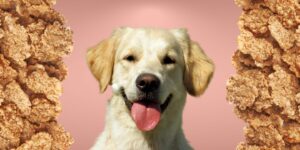Yes, dogs can eat lentils in moderation. Lentils are a healthy and nutritious addition to a dog's diet as long as they are cooked and served properly. They are an excellent source of protein, fiber, and other important nutrients for dogs and can help support a healthy immune system, metabolism, and overall well-being.
Nutritional Benefits of Lentils for Dogs
Lentils are an excellent source of protein, fiber, and other important nutrients for dogs. They are low in fat and calories, making them a healthy choice for dogs who are overweight or prone to weight gain. Lentils are also rich in vitamins and minerals, including iron, folate, and manganese, which can help support a healthy immune system, metabolism, and overall well-being in dogs.
How to Serve Lentils to Dogs
Lentils should be cooked before being served to dogs. Raw lentils are hard for dogs to digest and can cause stomach upset and other digestive problems. To cook lentils for your dog, rinse them thoroughly under running water and remove any debris or foreign objects. Place the lentils in a pot with enough water to cover them and bring the water to a boil. Reduce the heat and simmer the lentils until they are tender but not mushy. This usually takes about 20-30 minutes, depending on the type and size of the lentils.
Once the lentils are cooked, let them cool to room temperature and serve them to your dog as a tasty and healthy treat.
Portion Size
It's important to feed lentils to your dog in moderation and as part of a balanced diet. Lentils should not make up more than 10% of your dog's daily caloric intake. For a small dog, this means about half a cup of cooked lentils per day. For a larger dog, a serving of lentils should be about one cup per day. You can mix the lentils with your dog's regular food or serve them as a standalone treat. Just be sure to monitor your dog's reaction to the lentils and adjust the portion size accordingly.
Potential Risks of Lentils for Dogs
While lentils can provide numerous benefits to a dog's diet, there are also some potential risks and side effects to be aware of.
Allergic Reactions
Some dogs may be allergic to lentils, which can cause symptoms such as itching, skin rashes, and digestive issues. If you notice any of these symptoms after feeding your dog lentils, discontinue their consumption and consult your veterinarian.
Gastrointestinal Problems
Lentils are high in fiber, which can cause gas and bloating in some dogs. Introduce lentils to your dog's diet gradually to avoid these issues and monitor their reaction.
Interference with Nutrient Absorption
Lentils contain substances called lectins and phytic acid, which can interfere with the absorption of certain nutrients, such as calcium, iron, and zinc. To reduce these substances, soak the lentils before cooking and rinse them thoroughly.
Alternatives to Lentils for Dogs
If your dog does not tolerate lentils well, there are other healthy and nutritious legumes and plant-based protein sources that can be included in their diet.
Chickpeas
Chickpeas are high in protein and fiber, and they can be easily incorporated into a dog's diet by cooking them and mixing them with their regular food.
Green Peas
Green peas are another legume that provides protein and essential nutrients for dogs. They can be served cooked or frozen as a treat.
Beans
Beans, such as black beans, kidney beans, and navy beans, can also be a healthy addition to a dog's diet, as they are rich in protein and essential nutrients. Just be sure to cook them thoroughly before serving them to your dog.
Consult Your Veterinarian
Before making any significant changes to your dog's diet, it's always a good idea to consult with your veterinarian. They can provide personalized advice based on your dog's specific needs and help you determine the best dietary plan for your pet.











